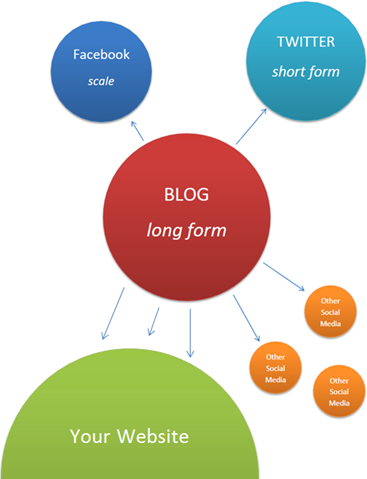 As I talk with business people all over the country on the benefits of blogging, organic search engine optimization and social media growth and engagement, I hear the same objections time and time again relative to creating and maintaining a business blog:
As I talk with business people all over the country on the benefits of blogging, organic search engine optimization and social media growth and engagement, I hear the same objections time and time again relative to creating and maintaining a business blog:
- "I don't understand why a business would blog. Isn't it personal?"
- "How would blogging possibly help us reach our business goals?"
- "Blogging is fine for others, but we're focused on our business don't have time to waste on idle chit chat."
- "Who has time to blog unless they're in college or unemployed?"
- And about a year ago I heard my all-time favorite objection yet:
- "Don't people often blog when just a simple tweet would do?" (a reference to Twitter and its 140-character limit and a shot at long-winded bloggers, all rolled into one)
All of these are legitimate questions and objections, which I'll hopefully address in this post.
Bottom Line: Businesses that don't invest in blogging are losing out on a huge opportunity.
Here are the top five reasons Why Business Blogging Matters, in order of importance:
1. Blogs Increase Search Equity.
Search Engines crawlers (affectionately known as "spiders") scour the internet for food daily; their favorite meals consist of text, headlines (H1 tags), page titles and links with descriptive anchor text. Well-crafted blogs are a virtual spider feast. The search engines behind these spiders don't really care if a newly discovered page is a blog or a regular web page; what they're particularly interested in is new, unique, well-crafted content. Blog posts between 400-600 words with good use of keywords in headlines, descriptive anchor text and relevant keywords purposely used throughout the post are like an all-you-can-eat buffet to the search engine spiders in a sea of soup kitchens. So the domains these Blogs reside on are rewarded with deposits in their search equity account. If your blog is on your company site (i.e. blog.yourcompany.com) then your site benefits and accrues the search equity; if you use a "free" blog site (i.e. yourcompany.blogspot.com) then Google or some other webhost gets the benefit.
2. Blogs Increase Website Traffic.
The clients who we have worked with to setup and properly promote integrated blogs (blog.yourcompany.com) have seen their traffic increase between 300% and 2,000%. The effect of these traffic gains - although by itself quite dramatic - is that the number of inbound links multiplies and additional search equity is applied.
A recent study conducted by HubSpot showed that businesses that blog generate an average of 55% more website traffic and nearly double the inbound links (the currency of the Internet) compared to businesses that do not blog.

3. Sharing Blog Content Creates Inbound Links.
Have you noticed that people typically don't share product information on Facebook? And not too many people tweet company information sheets, right? I know its disheartening to realize, but most of the online population resists the temptation to share the "About Us" page on your site.
People like to share things that are of interest to them on a personal level, and things they think their peers and friends would be interested in.
This is true for B-to-B as well. Blogs make it easy for people to share with others. They give site visitors a reason to connect on an emotional level. In our research we have data that proves that referred visitors are between 2X to 4X more likely to convert into a qualified lead or new customer than general website traffic, so the financial/rational argument for sharing can easily be made. When we setup client blogs we include the most popular business sharing tools as buttons to make tweeting, liking and stumbling upon as easy as emailing a friend.
4. Blogs Enable You to Sell Faster.
Blogs help qualify leads before they ever make contact with sales, meaning more people who do make contact are qualified to buy. I recently experienced this myself. A prospect for our business read a comment that I wrote on someone else's blog, liked the line of thinking of my comment as much if not more than the original author, followed the link I provided back to a blog post I wrote, read several additional posts, agreed with our approach and philosophy, then contacted me -- already "warm" as a highly-informed, qualified prospect. That is happening more and more, and would not have been occured before we started blogging.
5. Blogs Increase Search Engine Crawl Frequency.
The question of "If a tree falls in a forest and no one is around to hear it fall" has an application in the world of search: if a website gets updated and no search engine indexes the new page, did your update do your business any good? I've seen clients increase their crawl frequency from monthly to several times a week to daily; I have to attribute this primarily to the addition of an integrated blog, and the results are that changes to the site (i.e. page title testing, new content pages, news updates, etc.) get indexed nearly immediately, so we get a read on which changes had a positive impact right away. The whole process of test, read and refine is greatly accelerated.
A Word on Blogging Best Practices
The Best Practices of Blogging recommend that you spend equal portions of your time reading the blogs of others, commenting on those other blogs, and crafting your own. I recommend a time allocation of 1/3-1/3-1/3rd in these three areas.
So if you can only invest, say, 90 minutes/week to this valuable new pursuit of blogging, be sure you start with a half hour finding/reading other people's blogs of interest to you and your business goals, a half hour or more leaving comments and asking questions on those blogs, and an equal amount of time planning and writing your own posts.
Leaving Blog Bread Crumbs
Taking a cue from would-be social media pioneers Hansel & Gretel... One of the best ways to build a community and create relevant inbound links in the early days of blogging is to include a bread crumb - a link to your blog - every time you read and comment on someone else's relevant post or blog.
One example: "You wrote an interesting and provocative post about the greening of marketing, Michael. I thought you were absolutely right on your assessment of the topic of how direct mail impacts our environment, but I invite you to consider one idea you may have overlooked: Search is the new direct mail. I've written about this topic at http://blog.connectionmodel.com/blog/?Tag=inbound%20marketing and invite you to have a look..."
That way when interested readers see your comment and agree with your point of view or unique insight, they'll follow your link and discover your blog.
Talk Back
What are your most compelling reasons for creating and pubslihing on a business blog? Or if you think we got it wrong, tell us why.
Written By: David Carpenter

 As I talk with business people all over the country on the benefits of blogging, organic search engine optimization and social media growth and engagement, I hear the same objections time and time again relative to creating and maintaining a business blog:
As I talk with business people all over the country on the benefits of blogging, organic search engine optimization and social media growth and engagement, I hear the same objections time and time again relative to creating and maintaining a business blog:
